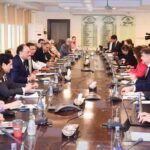Nawaz Sharif, the leader of the Pakistan Muslim League-Nawaz (PML-N), questioned Justice (retd) Ijazul Ahsan’s abrupt departure on Monday, stating that “a guilty conscience needs no accuser”.
Ahsan, the third seniormost member of the Supreme Court and the likely successor to Chief Justice Qazi Faez Isa upon Isa’s retirement, unexpectedly tendered his resignation on January 11.
Ahsan’s resignation, which stated that he just did not want to continue serving as a judge on the top court, was announced the day after Justice (retd) Sayyed Mazahar Ali Akbar Naqvi, who was the subject of multiple complaints, resigned.
“I was naive. He said this at a rally in Lahore’s NA-130 constituency, where he will run for office in the coming elections after a lifetime ban on holding public office was lifted. “A guilty conscience needs no accuser,” the judge who was appointed to monitor my cases […] and was about to become the chief justice in eight months resigned.
In order to supervise the filing of the references that the National Accountability Bureau (NAB) has been instructed to submit against Nawaz Sharif and his family, Ahsan was appointed by then-CJP Saqib Nisar in 2017.
After completing a four-year self-exile in London, Nawaz returned to Pakistan and soon after won his acquittal in the corruption cases against him, stating: “I’ve been proven innocent, but the judges who found me guilty have all retired from their positions.”
Inspiring followers to cast their ballots for the PML-N in the elections scheduled for February 8, Nawaz promised to “leave no stone unturned” in order to guarantee Pakistan’s advancement.
“When Nawaz Sharif was in charge, there was harmony. Petrol was inexpensive, and there was no inflation. The leader of the PML-N, who is considering a fourth term as prime minister, declared, “I want to bring that era back and want to see that peace once more in your homes.”
Since Pakistan Tehreek-e-Insaf’s electoral emblem, the “bat,” was taken away, the PML-N and its erstwhile ally, the Pakistan Peoples Party, appear to be in conflict at the national level.







